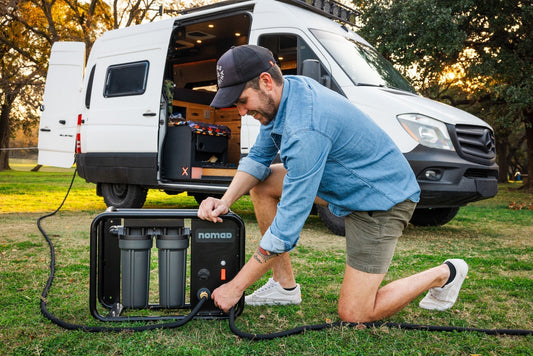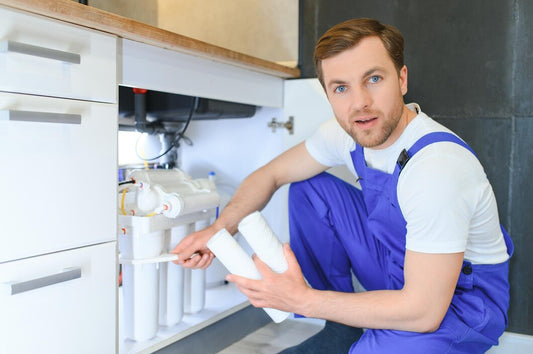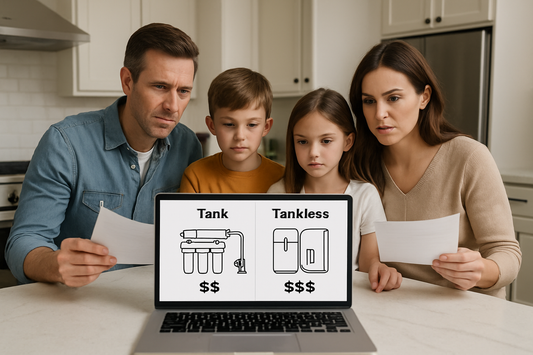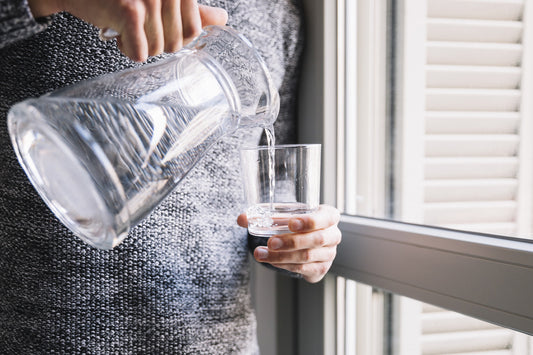That frustrating moment when you step out of what should be a refreshing shower, only to be greeted by cloudy, spotted glass doors that make your bathroom look perpetually dirty. If you're nodding along, you're not alone—hard water stains on glass surfaces plague millions of American households, turning what should be sparkling clean surfaces into stubborn, chalky eyesores.
But here's the thing: those spots aren't just cosmetic. They're actually telling you a bigger story about your water quality—and once you understand that story, you'll discover not just how to remove hard water stains from glass, but how to prevent them from coming back entirely.
Understanding Hard Water Stains: The Real Culprit Behind Your Glass Woes
Hard water stains aren't just random spots that appear on your glass. They're mineral deposits—primarily calcium and magnesium—that get left behind when hard water evaporates. Think of it like invisible chalk dissolved in your water that becomes visible the moment it dries.
When your water contains high levels of these minerals (typically over 60 milligrams per liter), every drop that touches your glass surfaces is essentially carrying tiny particles that bond to the surface. Over time, these deposits build up, creating that familiar cloudy, white film that seems impossible to remove.
The challenge with glass surfaces is their smooth, non-porous nature actually works against you. While smooth surfaces should theoretically be easier to clean, the mineral deposits create microscopic etching that gives them something to grip onto, making removal increasingly difficult over time.
The Immediate Solutions: Hard Water Stain Removal From Glass Shower Doors
The Vinegar Method: Your First Line of Defense
White vinegar remains the gold standard for hard water stain removal glass shower doors treatment. The acetic acid in vinegar dissolves calcium and magnesium deposits naturally, making it both effective and safe for most glass surfaces.
Step-by-step process:
- Heat white vinegar to lukewarm temperature (never boiling)
- Apply generously to affected areas using a spray bottle
- Let it sit for 15-20 minutes to break down mineral deposits
- Gently scrub with a non-abrasive sponge
- Rinse thoroughly with clean water
- Dry immediately to prevent new water spots

Image by The Yuri Arcurs Collection
The Steel Wool Technique: For Stubborn Deposits
For older, more established stains, ultra-fine steel wool (grade 4-0) can safely remove deposits without scratching glass. The key is using the finest grade possible and keeping the surface wet throughout the process.
Important safety notes:
- Always use the finest grade steel wool available
- Keep the glass surface wet while scrubbing
- Work in small, circular motions
- Rinse frequently to remove loosened deposits
- Never use steel wool on tempered or treated glass
Commercial Solutions: When DIY Isn't Enough
Sometimes household remedies aren't sufficient for severe buildup. Commercial lime and calcium removers are specifically formulated for tough mineral deposits, though they require careful handling and proper ventilation.
The Prevention Strategy: How to Get Hard Water Stains Off Glass Permanently
Here's where most guides stop—but this is where the real solution begins. While cleaning methods remove existing stains, they don't address the root cause: your water quality. Every time you clean those spots, you're essentially fighting a losing battle against the minerals in your water supply.
Daily Maintenance: Your First Defense
The most effective prevention starts with simple daily habits:
Post-shower routine:
- Squeegee glass surfaces immediately after use
- Keep a microfiber cloth handy for quick drying
- Ensure adequate ventilation to reduce humidity

Image by koldunova_anna
Water Repellent Treatments: Temporary Protection
Water repellent coatings create a protective barrier that causes water to bead up and roll off glass surfaces. While these treatments need regular reapplication, they significantly reduce mineral adhesion.
Application tips:
- Clean glass thoroughly before application
- Apply in thin, even coats
- Buff immediately to prevent streaking
- Reapply monthly for optimal protection
The Permanent Solution: Addressing Water Quality at the Source
If you're tired of the endless cycle of cleaning and re-cleaning, it's time to consider treating your water quality directly. This is where understanding your water's mineral content becomes crucial for long-term prevention.
Water Softening: The Comprehensive Approach
A water softener for hard water stains works by removing calcium and magnesium ions before they reach your glass surfaces. This process, called ion exchange, replaces these minerals with sodium ions that don't leave deposits when water evaporates.
Benefits of water softening:
- Eliminates the source of hard water stains
- Reduces soap scum and cleaning product usage
- Extends the life of plumbing fixtures and appliances
- Improves skin and hair health
Filtration Systems: Targeted Treatment
For households seeking comprehensive water treatment, whole-house filtration systems can address multiple water quality issues simultaneously. These systems not only reduce mineral content but also improve taste, odor, and overall water quality.
Advanced Prevention Techniques
Understanding Your Water Hardness Level
Before investing in treatment systems, test your water hardness. Water testing kits or professional testing can determine your exact mineral content, helping you choose the most appropriate treatment method.
Water hardness scale:
- Soft: 0-60 mg/L
- Moderately hard: 61-120 mg/L
- Hard: 121-180 mg/L
- Very hard: 181+ mg/L
Seasonal Considerations
Water hardness can fluctuate seasonally, particularly in areas with well water. Summer months often see increased mineral concentration due to reduced groundwater levels, making prevention strategies even more important during these periods.
Maintenance and Long-term Care
Creating a Cleaning Schedule
Establish a routine that matches your water hardness level:
- Soft water: Weekly light cleaning
- Moderately hard water: Bi-weekly deep cleaning
- Hard water: Weekly vinegar treatment
- Very hard water: Daily maintenance with weekly intensive cleaning
Monitoring Treatment System Performance
If you've invested in water treatment, regular maintenance ensures continued effectiveness:
- Replace filters according to manufacturer recommendations
- Monitor salt levels in water softeners
- Test treated water periodically to confirm system performance
Troubleshooting Common Issues
When Stains Won't Budge
Extremely stubborn stains may require professional restoration or indicate that mineral deposits have permanently etched the glass. In these cases, replacement might be more cost-effective than continued cleaning attempts.
Recurring Stains After Treatment
If stains return quickly after cleaning, it typically indicates:
- Insufficient drying after cleaning
- Inadequate water treatment
- Need for more frequent maintenance
The Bottom Line: Prevention Over Cure
While knowing how to remove hard water stains from glass is essential, the real solution lies in prevention. By addressing your water quality at the source—whether through softening, filtration, or comprehensive treatment systems—you can eliminate the root cause of hard water stains and enjoy crystal-clear glass surfaces with minimal maintenance.
Remember, every minute you spend scrubbing mineral deposits is a minute you could be enjoying your clean, clear glass surfaces. The investment in proper water treatment pays dividends in reduced cleaning time, extended fixture life, and the simple pleasure of stepping into a bathroom with sparkling, spot-free glass.
FAQ
How often should I clean hard water stains from glass?
The frequency depends on your water hardness level. For moderately hard water, weekly cleaning prevents buildup. Very hard water may require daily maintenance with weekly deep cleaning sessions.
Can hard water stains permanently damage glass?
Yes, prolonged exposure to hard water can cause permanent etching on glass surfaces. The minerals create microscopic scratches that become increasingly difficult to remove over time.
Will a water softener completely eliminate hard water stains?
A properly sized and maintained water softener can eliminate up to 99% of calcium and magnesium, virtually eliminating new hard water stain formation on glass surfaces.
Is it safe to use vinegar on all types of glass?
White vinegar is safe for most standard glass surfaces, but avoid using it on natural stone surrounds or specialty coated glass without testing a small area first.
How do I know if my water is hard enough to cause stains?
Water hardness above 120 mg/L typically causes noticeable staining. Home test kits can measure your water's mineral content to determine appropriate treatment needs.






